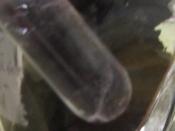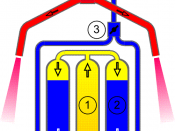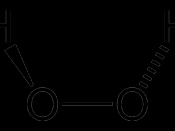The effect of hydrogen peroxide on catalyse if you change the temperature
Plan:
Aim:
My aim in this investigation is to find out and investigate how the temperature affects the rates of reaction of the enzyme catalyse on its substrate hydrogen peroxide.
An enzyme is a biological catalyst, it alter the rate of reaction without being changed itself. Enzymes are proteins; they have a very precise three-dimensional shape, which forms a one specific active site on the enzyme. Each enzyme can only convert one kind of substrate molecule in to one kind of product molecule. These are specific.
What affects Enzymes?
÷ Temperature- Enzymes stop working if the temperature rises above 40úC. Increasing the temperature alters the 3D shape and so the enzyme can no longer fit the substrate.
÷ pH- They work best in neutral conditions neither acidic nor alkaline.
What affect does catalyse have?
Catalyse is a very fast reacting enzyme, it is found in many living cells, it breaks down hydrogen peroxide to water and oxygen.
In fact one molecule of it can deal with six million molecules of hydrogen peroxide in 1 minute. Hydrogen peroxide is toxic so needs to be changed into harmless substances.
Apparatus:
÷ Hydrogen peroxide 30ml
÷ 25ml cylinder tube
÷ Kettle
÷ Water bath
÷ Hot water bath
÷ Delivery tube
÷ Conical flask
÷ Thermometer
÷ Clamp
÷ Burette (60cm)
÷ Stop watch
÷ White tile
÷ Knife
÷ Ruler
÷ Rubber bung
÷ Goggles
÷ Flask
÷ Stop watch
÷ Potato
Method:
÷ Put goggles on
÷ Gather all the equipment
÷ I will then put all my apparatus together ensuring that I have assembled everything correctly
÷ Warm the water up in the kettle
÷ I will then get the white tile and place the potato onto the...


